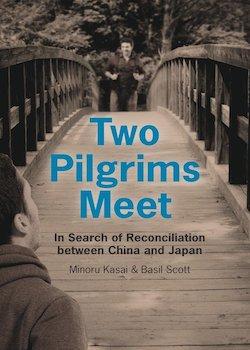Two Pilgrims Meet: In search of Reconciliation between China and Japan

By Minoru Kasai and Basil Scott
New Generation Publishing, 2016
ISBN-13: 978-1787190573
Review by Revd Ikuko Williams
Two Pilgrims Meet: In search of Reconciliation between China and Japan is a fascinating book, and I would heartily recommend it to anyone, but especially to those interested in reflecting on the complex facets of reconciliation between countries with a history of enmity in the past. The two authors Minoru Kasai and Basil Scott who became friends out of rather unusual circumstances, share their personal stories and reflections on this very important topic and readers are invited to join in their journeys of pilgrimage in search of truth and reconciliation; many words of wisdom appear through their ‘conversation’. The nature of the book illustrates how we all visit and revisit our past repeatedly, to make sense of it and to find the best way forward for the greater common good. It helps us to realise that the nature of the reconciliation process is never a straightforward or short one, and that it takes a great deal of engaging in humble and honest reflection on the past and the present as well as holding onto a hopeful vision for what the authors call the ‘blessed reality’ given by God, whilst aspiring to regard humanity as a ‘healing family’.
The authors, one Japanese and the other British, met at an Indian university, as each was engaged on his own, very personal philosophical quest. During the course of their meeting in Varanasi, India, they discover that their childhood years had been spent in the same city of Shanghai during the War, though they never met there, as, ironically, they were the children on ‘opposite’ sides. While Basil was confined for several years in a Japanese internment camp, Minoru was living, only a few miles away on the other side of the river, as part of the large Japanese presence in the city. It is heart-warming to learn how the two men found a kindred spirit in India while remaining aware of this dramatic backdrop. 40 years later, they had a chance to meet again, at which point they embarked on a spiritual joint journey of pilgrimage for reconciliation.
In 2006, the two men made a joint return visit to Shanghai, where they travelled together to both sides of the river within the city, putting themselves where each other had been all those decades earlier. The physical act of going to the other’s side symbolised their mental and spiritual movement to place themselves in the other’s shoes and to see things from the other’s perspective. As they note with great poignancy, ‘Reconciliation is not only meeting in the middle of a bridge, but going together to both sides to see the other’s point of view’.
Their story tells us eloquently how reconciliation requires a willingness to go to see ‘the other’s point of view’, and how it calls for spiritual humility and openness. Basil recalls his thoughts as he visited Japan prior to re-visiting Shanghai in 2006: ‘God was trying to enlarge my thinking … (and) … my heart to love people I had not thought of embracing. … the action I needed to take was to make a space for the other, to listen to a people I did not know and to take an interest in their concerns’(p.95).
Their conversation also points to the importance of awakening to the ‘blessed reality’ given by the love of God which frees us from bitterness and hatred. They speak of their deep gratitude for the gift of unexpected given-ness which is found in reconciliation. And their spiritual perspective on reconciliation is then applied to their discussion about a better future for the relationship between Japan and China, the country of their childhood homes. What comes out beautifully through their shared journey is the hope which they had come to know through their experiences, reflections and their quiet faith in the transforming love of God.
I happen to be a Japanese national who has been living in Britain for the last 29 years, and the issue of reconciliation, in particular with the former Far East POWs, has been a serious concern of mine. Hence, my natural interest in this publication. I am also a graduate of International Christian University in Tokyo, where I knew of Professor Minoru Kasai, though not personally. I am very grateful to have a chance to get to know his amazing life journey, so humbly told in this book.
This book was an inspirational and interesting read for me personally, and I would like to thank the authors for bringing their insightful ‘conversation’ to publication. I do hope that this will be published in Japanese translation for a wider audience, as the authors’ advocacy of reconciliation is surely needed more than ever. This book offers us all genuine encouragement to commit seriously to the building of trust-based relationships between neighbouring countries on a person-to-person level, and shows how this is needed just as much as government-level initiatives.

